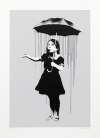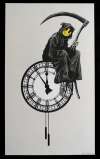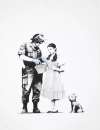The Expert Guide To Selling A Banksy

Market Reports
Key Takeaways
How to Sell a Banksy Print Step-By-Step
- Confirm Pest Control certification before entering the market.
- Assess signed vs unsigned status and recent comparables.
- Understand how colourway and edition structure affect value.
- Price according to current liquidity, not 2021 peak levels.
- Choose route to market carefully – visibility does not always equal control.
Banksy’s market operates differently from other blue chip contemporaries. Governed by Pest Control rather than gallery representation, and shaped by cultural visibility as much as auction precedent, his print market in 2025 is defined by selectivity rather than speculation. This guide outlines current pricing dynamics, authentication requirements, and the strategic considerations that matter when bringing a Banksy print to market.
Is Now a Good Time to Sell a Banksy Print?
Banksy’s print market has moved beyond its 2021 speculative peak and into a more disciplined phase. In 2025, total sales value has stabilised and average prices have modestly strengthened year-on-year, despite lower overall lot volume. Demand has consolidated around certified, recognisable works rather than broad-based momentum.
This environment favours well-positioned prints brought to market with realistic pricing and clear documentation. Scarcity has become more pronounced as fewer owners are choosing to sell, but outcomes depend heavily on certification status, edition type, and imagery strength.
Banksy Market Performance – What Is Driving Value in the Banksy Market?
Banksy’s print market is structured around hierarchy. Iconic images function as pricing anchors, while less recognisable editions transact within narrower bands. Performance is driven less by volume and more by image recognition, certification, and supply discipline.
Girl With Balloon, Kate Moss & Flower Thrower: Benchmark Editions in 2025
These works continue to act as barometers of market sentiment. Following correction from 2021 highs, values have stabilised within more sustainable ranges. Signed editions command clear premiums, while unsigned works remain liquid entry points – provided Pest Control certification is in place.
Selling During Periods of Cultural Visibility
Banksy’s market often responds to renewed street activity and public interventions. His recent murals – including the Royal Courts of Justice piece in London and the Marseille intervention earlier this year – have sustained international attention and reinforced his cultural relevance. As explored in our guide to Banksy’s street murals, these moments can increase buyer engagement, particularly for closely associated imagery.
That said, visibility does not override pricing discipline. Condition, Pest Control certification, edition structure, and realistic comparables remain the primary determinants of outcome when bringing a print to market.
How Much Is My Banksy Print Worth?
Valuation in Banksy’s market is driven by four core variables: signed status, edition size, colourway, and Pest Control certification. Works that have never previously appeared on the secondary market can generate heightened interest, particularly when early release examples or rare colourways surface for the first time. However, first-time availability does not automatically justify peak-era pricing.
Comparables from 2021 are no longer reliable benchmarks. Pricing must reflect current liquidity levels, recent transaction data, and how a specific edition is trading today rather than during the speculative cycle.
Signed vs Unsigned Banksy Prints: Value Differences
Signed editions consistently achieve higher prices due to scarcity and Banksy’s distinctive signature. Unsigned editions, issued in larger quantities, remain highly liquid but trade within tighter pricing bands. As explored in our latest Banksy Market Report, these two segments effectively operate as parallel markets, with different buyer profiles, price sensitivities, and volatility patterns.
In both cases, Pest Control certification is essential for participation in the secondary market and remains a core component of value.
Colourway and Rarity in Choose Your Weapon and Other Editions
Colour variation plays a material role in valuation. Frequently traded colours support consistent demand, while rarer variants can command premiums when well-timed to market. However, rarity alone does not guarantee uplift; liquidity, recent comparables, and buyer familiarity remain critical to outcome.
For a detailed breakdown of how individual colourways have performed – including supply frequency and price differentials – see our Choose Your Weapon Market Report.
Artist’s Proofs and Special Editions
Artist’s proofs (APs) and hand-finished variants can command premiums, particularly in iconic series. Record results – such as Girl With Balloon (gold) AP – demonstrate the upper ceiling of the market. That said, premiums are conditional on certification, condition, and demand at the time of sale.
How to Prove Your Banksy Print Is Real Before Selling
In Banksy’s market, authentication directly determines tradability and value.
Pest Control Authentication
Since 2009, Pest Control has been the sole body authorised to authenticate Banksy works. A valid certificate of authenticity (COA) is required for resale. Without it, reputable auction houses and private platforms will not transact.
For a detailed breakdown of how the verification process works – including timelines, common pitfalls, and documentation requirements – see our guide to Pest Control authentication.
Certificate details must precisely match the physical print, and all supporting purchase documentation should be retained before entering the market.
How to Conserve Your Banksy Print to Retain Value
Condition materially affects resale value, particularly for early 2000s editions produced before Banksy’s market matured.
Early Paper Quality and Ageing Issues
Some early prints were produced on acidic or less archival paper, making them susceptible to discolouration and foxing. Improper framing or prolonged light exposure can significantly reduce value.
Avoid Unauthorised Restoration
Over-cleaning, margin trimming, or undocumented restoration can permanently damage resale prospects. Conservation should only be undertaken by recognised professionals, with full documentation retained.
Looking to Sell Your Banksy Print?
Browse Banksy prints on the Trading Floor and request an instant, data-led valuation to understand where your work sits within today’s market hierarchy.
Where Can I Sell My Banksy?
Choosing route to market directly impacts pricing control and risk exposure.
The Risks of Consigning a Banksy Print into Auction
Auction offers visibility but introduces public estimate anchoring and the risk of buy-ins. In a selective market, misaligned estimates can permanently affect perception. Timing is fixed and competitive context is outside the seller’s control.
The Benefits of Selling a Banksy Print Via Private Sale
Private sale allows targeted placement, controlled pricing, and discretion. This is often advantageous for liquid, benchmark editions where demand exists but public volatility is unnecessary.
Why Sell Your Banksy Print with MyArtBroker
Specialist-Led Valuation
Each work is assessed individually, using live market data and recent comparables.
0% Seller’s Fees
Sellers retain 100% of the agreed sale price. Fees are applied on the buyer side.
Minimise Risk
Private transactions avoid public buy-in records and estimate anchoring.
Global Network
Access to over 30,000 active collectors ensures targeted placement rather than broad exposure.












